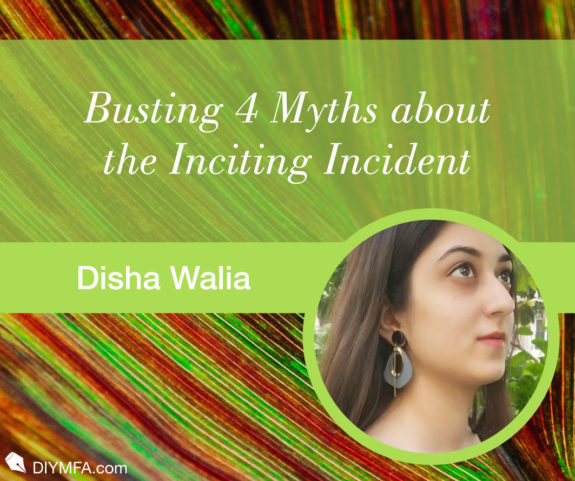Hello beautiful people of the Internet! Welcome back to Worldly Wise, where we’re going to take the reins of your speculative fiction story and see it to the finish line together. Last time, we figured out what we should absolutely not include in the first chapter. Now that the first chapter is out of the way, you want to write the perfect inciting incident for your speculative fiction, so let’s unravel that mystery.
But first things first, what is the inciting incident? Well, simply put, it is the event that sets your story into motion. This is the event that makes your character decide between the two choices they have. It paves the way for their future journey. Sadly, there are myths surrounding this seemingly complex, but crucial, story beat. Let us debunk some of these myths and write the perfect inciting incident for your novel:
Myth 1: The Inciting Incident Should Be An Exciting Event
We can often get fixated over a great call to adventure that can propel the story forward. It is a jaw-dropping, never-before-written idea. You are sure the readers will love it and I am too. However, hold your horses. An inciting incident in itself is not going to make your readers resonate with your story. It does not matter whether you are introducing them to a unique world or have a masterful way of showcasing a sci-fi element. What you want to do first is to establish a connection between your reader and protagonist. The inciting incident is all about the readers understanding what is at stake for the protagonist. Yes, the inciting incident can be an exciting event. But no one is going to care about it if they don’t care about your protagonist.
Myth 2: It Is The Introduction To Your Story
Often confused for being the first event in a story, an inciting incident can be better understood as the event that makes your protagonist take the first solid action in their journey. There can and should always be a first event that then leads up to the inciting incident. That first event, like a conversation or a background story, can help establish the stakes. When the inciting incident strikes and forces your character to take action, it will be more impactful than a random exciting event happening to them. Remember, this is not the point where you unload world building on your readers. This is where you get them wondering what the journey holds.
Myth 3: It Can Replace The Hook
Never consider ‘the hook’ and ‘inciting incident’ as synonymous. The hook is something that grabs your reader’s attention. It is the opening scene that makes the readers continue reading the next page or even the next scene. An inciting incident is what makes the protagonist take a solid action in the direction of their journey. For the readers, it works as sort of a catalyst for the plot. It makes them want to stay longer and go on the epic adventure with the characters they are being introduced to. Yes, an inciting incident and hook can be the same event, but they are not easily replaceable by one another.
Myth 4: The Inciting Incident Is All About Curiosity
The decision the protagonist takes post-inciting incident is not supposed to leave the readers confused. It should align with the stakes and make sense to the personality of the protagonist. This is probably one of the worst times to make the protagonist do something out of character. This does not mean an inciting incident cannot evoke any sort of curiosity in the readers. It should. However, this is not all about curiosity. If your readers are wondering more about what is happening than looking forward to the story, it might be off-putting for some. This is especially why you should hold off introducing them to a new world or to too many characters in the first few pages. Inciting incident should help gain some sort of clarity in the situation. At the least, it should tell the readers where the journey is going to be headed.
Have you ever believed in one of these myths about inciting incidents? Are there any other myths you know of or are guilty of believing? Let me know in the comments below. Until next time!

Disha Walia is a lifelong storyteller and an enthusiastic writer and editor in love with the idea of exploring the creative world of words. While making her space in the world of non-fiction and fiction alike, Disha loves to spend even her free time daydreaming about what next to write. Connect with her on www.quillinary.com. You can also follow her on Instagram and Twitter.







